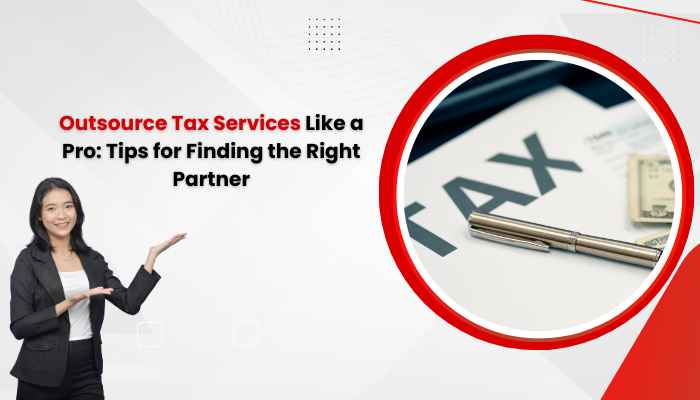Taxes can be complex, time-consuming, and constantly changing, making compliance and optimization challenging for businesses to manage on their own. This is where outsourcing tax services becomes a smart strategy. The right partner will ensure compliance, enhance efficiency, and reduce costs. But how do you choose the right one? Follow this guide to make an informed decision.
1. Know Your Business’s Tax Obligations
Before you start looking for an outsourcing partner, clearly define your specific tax requirements. Every business has unique needs, and understanding yours will help narrow down your choices.
Consider the following:
- Scope of Services – Do you need tax preparation, planning, audit support, or full-service tax management?
- Industry Expertise – Some industries have unique tax regulations. Does your provider have experience in your sector?
- Compliance Obligations – Ensure they are knowledgeable about local and international tax laws, if applicable.
- Software Compatibility – Will their systems integrate seamlessly with your accounting software?
2. Shortlisting Reputable Companies Through Research
Once you’ve determined your tax needs, start searching for outsourcing firms with a strong track record and solid client reviews.
Where to Search for Credible Providers:
- Professional accounting associations and directories
- Online reviews and testimonials
- Recommendations from industry peers
- Case studies showcasing past work
3. Assess Their Credentials and Background
When outsourcing tax services, experience, and credibility are crucial. You want a provider you can trust with your sensitive financial data.
Key Aspects to Evaluate:
- Certifications – Look for CPA, EA, or other relevant tax certifications.
- Years of Experience – More experience typically means deeper expertise.
- Client Portfolio – Have they worked with businesses similar to yours?
- Regulatory Compliance – Are they up to date with the latest tax laws?
4. Evaluate Their Security Controls and Systems
Tax services involve handling confidential financial data, so security should be a top priority. A reliable outsourcing partner should have strong cybersecurity measures in place.
Important Security Features to Consider:
- Encryption protocols and secure data transfer mechanisms
- Compliance with data protection laws (GDPR, HIPAA, etc.)
- Multi-factor authentication for added security
- Disaster recovery plans and data backup systems
5. Learn Their Pricing Structure
Cost is a key factor when choosing an outsourcing provider, but the cheapest option isn’t always the best. Understanding different pricing models will help you make a cost-effective decision.
Common Pricing Strategies:
- Fixed Fees – A set amount for specific services.
- Hourly Rates – Charges based on the time spent on your tasks.
- Value-Based Pricing – Pricing is based on the complexity and value of the service provided.
6. Ensure Availability of Communication
Clear and timely communication is essential when you outsource tax services. You need a provider who is readily available to address urgent tax-related matters.
What to Look for in Communication:
- Dedicated tax specialists or account managers
- Availability across different time zones
- Clear response times and support channels
- Regular reporting and updates
7. Request a Trial or Pilot
Before committing to a long-term contract, request a trial service or a small pilot project. This allows you to evaluate their efficiency, accuracy, and ability to meet deadlines.
Benefits of a Trial Run:
- Test their expertise in handling your tax requirements
- Identify potential gaps or issues in their service
- Ensure compatibility with your business operations
8. Carefully Review Contract Terms
Never rush into signing an agreement without thoroughly reviewing the contract terms. Transparency in service deliverables, fees, and confidentiality clauses is essential.
Key Contract Elements to Review:
- Scope of work and deliverables
- Data security and confidentiality clauses
- Termination and exit strategy
- Payment terms and additional fees
9. Consider Long-Term Scalability
Your business will evolve, and your tax needs may change over time. Choose an outsourcing provider that can scale with your business and adapt to changing financial landscapes.
Scalability Considerations:
- Can they handle increased workload demands?
- Do they offer additional services you may need in the future?
- Are they proactive in suggesting tax-saving strategies?
Final Thoughts
Choosing to outsource tax services is a smart move for businesses aiming to enhance efficiency and ensure compliance. By carefully assessing potential providers based on expertise, technology, security, communication, and scalability, you can find a partner that aligns with your business goals. A well-chosen outsourcing firm not only takes the tax burden off your shoulders but also helps you optimize financial strategies for long-term success.
Reference This Article- How to Save Time and Money When You Outsource Tax Preparation
 :
https://www.pinterest.com/inveduss/
:
https://www.pinterest.com/inveduss/












